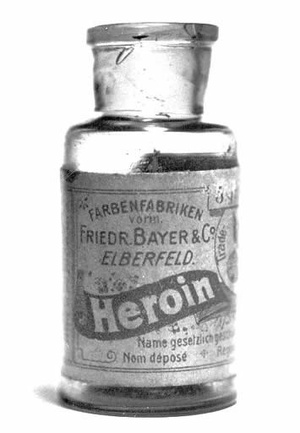… right before we can gain hindsight
It’s amazing how many household products of the ancient and recent past were used without a second thought and ended up being extremely harmful: asbestos, cigarettes for asthma, mercury in tooth fillings, DDT, over the counter opium for babies. (Go ahead click that previous link. Be culturally mind blown.) We laugh at our parents and grandparents for thinking they were considered safe. But how could they know? How did the first cave people learn which berries were safe and which caused deadly dehydration from diarrhea? You went to you neighbor’s poop stained cave and put 2 and 2 together – “never eat the berries Drog and Tera gather.” So too do we gather information on what to-do and not-to-do over the generations. We learn from example. Such is the passing of cultural knowledge.
We should be doing our best to eliminate the bad examples from our current generation. (Note: this is not advocating for the elimination of evidence of the mistake. Keep ALL the data! Good and bad. Just correct course and stop making the same mistake.) Minimize our chances of being the fools of history. We must answer the question “how could they have done that,” then apply what we learn to answer the more important question – what are we doing now that will make our grandchildren laugh at us?
You’d think we’d be trying our best to eliminate the bad examples from our current generation. You’d think we are so much better. Such is generational bias. We tend to assume those before us were so dumb to not have accomplished what we’ve accomplished. Yet we wouldn’t be where we are without them. And at the same time we are reluctant to give control over to the coming generation because they are too inexperienced and naive to know what they are doing.
Testing, Testing, Testing… forget it, just gimmie the shiny!
No one in history has the technological advantage we have. We have all this knowledge and experience provided by the previous generations. Our technology has given us great benefits. Our testing methods have improved beyond the simple taste test. (We usually don’t just jump right in licking every new product we make.) We can test our products with very little human and environmental risk. (Ya, ya, sit down PETA. I know animal testing is still done. And thankfully being done less and less. But it’s need has existed during this transitional period to better technology and modeling we can now perform via computer simulations. And you’re some damn hypocrites. So STFU!) But this ability to test safely doesn’t mean we are immune to the problems our ancestors faced. We aren’t immune to our flaws. We are guilty of accepting assumed results between similar products. We easily get caught up in habits and go along with the “tried and true” practices and standardizations, until they break horribly. And balance that with doing our best to know when to not mess with “tried and true” practices just to “see what will happen” if and when the stakes are too high. (Crystal Pepsi, the Chernobyl of beverages.) We rush things to market in order to kill the competition and gain the highest profits. Furthermore, we’ve gotten so good at “hunting and gathering” that all sorts of new methods and products that never existed – especially since the Industrial Revolution – have exponentially flooded the marketplace. Our innovation is limitless. It even seems that despite our ability to test thoroughly, we are ignoring the importance of testing. Or we simply can’t keep up. We aren’t allowing enough time to test and catch everything dangerous before it’s dumped lovingly onto the marketplace and environment.
The power to better help and harm ourselves
But we do it all for our betterment. And overall, our technology has vastly been for the better. Just look at life expectancy increase over time. But how many people have been the unwilling test subjects that we’ve learned from?
Despite our ability to test thoroughly and assuming how amazing we are, how many “great ideas” will our grandchildren laugh at us about? We sit on a very perilous perch in history. (We can probably say this for most of humanity. It has always been a constant struggle for survival. But having said that…) We’ve never had such a great power and ability to change our lives simultaneously for the better and worse. Our innovation is a double edged sword. We must wield it like a trained samurai – only when necessary and with the utmost care and accuracy. We need to train ourselves and therefore our culture how to assume, measure, test, and accept the pros and cons of the inventions we create. We must be willing on a personal level to question the cultural path we find ourselves walking down. Just because it works for now and it’s what has worked before doesn’t make it the only or best solution. It doesn’t make it good for you personally or for society as a whole in the long run. Everything changes. Even risks previously thought to be nonexistent can prop up in the new environment. Everything is in flux. We must be willing to go back, question, and, if needed, re-validate the tests we’ve done using our greater experience, tools, and knowledge. Perhaps we’ve missed something that we could make right for the future.
What risks are you willing to accept?
We willingly (and often unknowingly) accept the risks that our shiny new products bring. It’s a delicate balancing act. How much risk are we willing to accept for the gains our technologies bring us? We didn’t evolve culturally nor biologically in the environment we are increasingly altering. This alteration might outpace our ability to adapt. How much can we push it? When will we find it’s too much? How many lessons will we harmfully teach ourselves and be the bad example for future generations? There are bound to be some snags on the way as we race at an ever increasing pace. The risks have never been higher either. We are almost too creative in our inventing and, sadly, inexcusably lazy in our testing. Here’s to finding out the crap causers (I’m looking at you Olestra) as soon as possible in our flooded marketplace and environment, and to using better testing to prevent the stains from ever reaching our cave floors.

